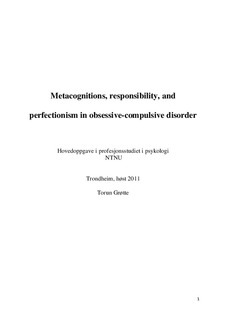Metacognitions, responsibility, and perfectionism in obsessive-compulsive disorder
Master thesis
Permanent lenke
http://hdl.handle.net/11250/270802Utgivelsesdato
2011Metadata
Vis full innførselSamlinger
- Institutt for psykologi [2970]
Sammendrag
The aim of this paper was to further test Wells` (1997) metacognitive model of obsessive-compulsive disorder (OCD). Metacognitions` (thought-fusion beliefs and beliefs about rituals) influence on obsessive-compulsive symptoms was evaluated and compared to the role of two central cognitive beliefs; inflated responsibility (Salkovskis, 1985, 1999), and perfectionism (e.g. Frost & Steketee, 1997). The following hypotheses were tested: (1) Metacognitions, inflated responsibility, and perfectionism will be positively and significantly correlated with obsessive-compulsive symptoms, (2) Metacognitions will be an independent predictor of obsessive-compulsive symptoms, even when depression and the cognitive beliefs are controlled, (3) The relationship between the cognitive beliefs and obsessive-compulsive symptoms will be dependent on metacognitions. The sample consisted of 62 OCD-patients, who completed an in-patient cognitive-behavioral treatment (CBT) with duration of three weeks. A series of correlational and multiple regression analyses were performed, and all three hypotheses were confirmed. The results provide further support for the metacognitive model of OCD (Wells, 1997).
